Leadership and Management Roles, Theories and Approaches: Report
VerifiedAdded on 2020/07/22
|16
|4996
|36
Report
AI Summary
This report provides a comprehensive overview of leadership and management, focusing on the roles of leaders and managers within an organization, particularly using McKinsey & Company as a case study. It explores the differences between managers and leaders, highlighting their respective responsibilities in various situations, such as decision-making, strategy building, problem-solving, and resource allocation. The report delves into key leadership theories and models, including situational leadership. Furthermore, it discusses the significance and values of operational management in achieving organizational objectives and analyzes the impact of business environment factors on operational management. The content includes an introduction, tasks covering roles, theories, and approaches, and a conclusion, providing a well-rounded analysis of the subject matter.
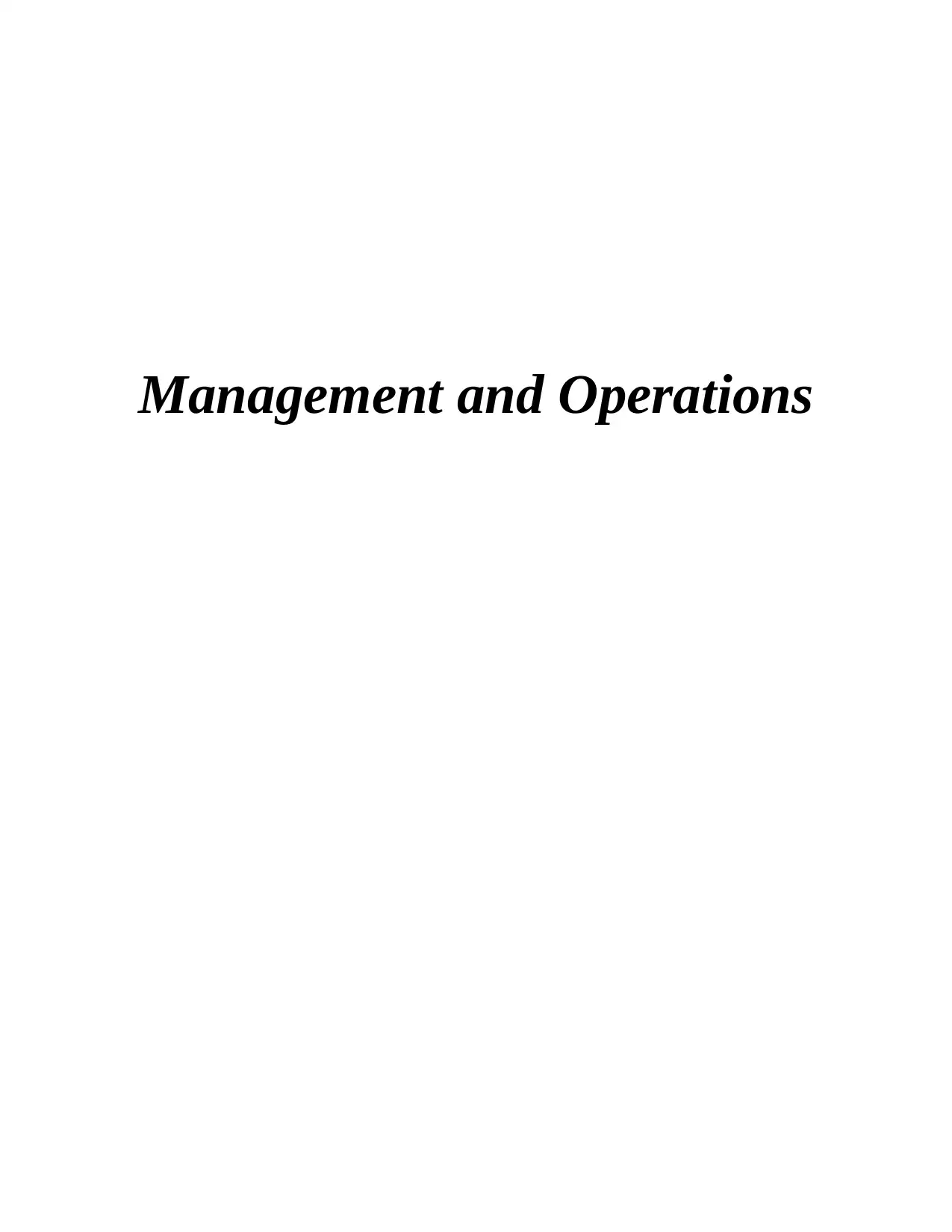
Management and Operations
Paraphrase This Document
Need a fresh take? Get an instant paraphrase of this document with our AI Paraphraser
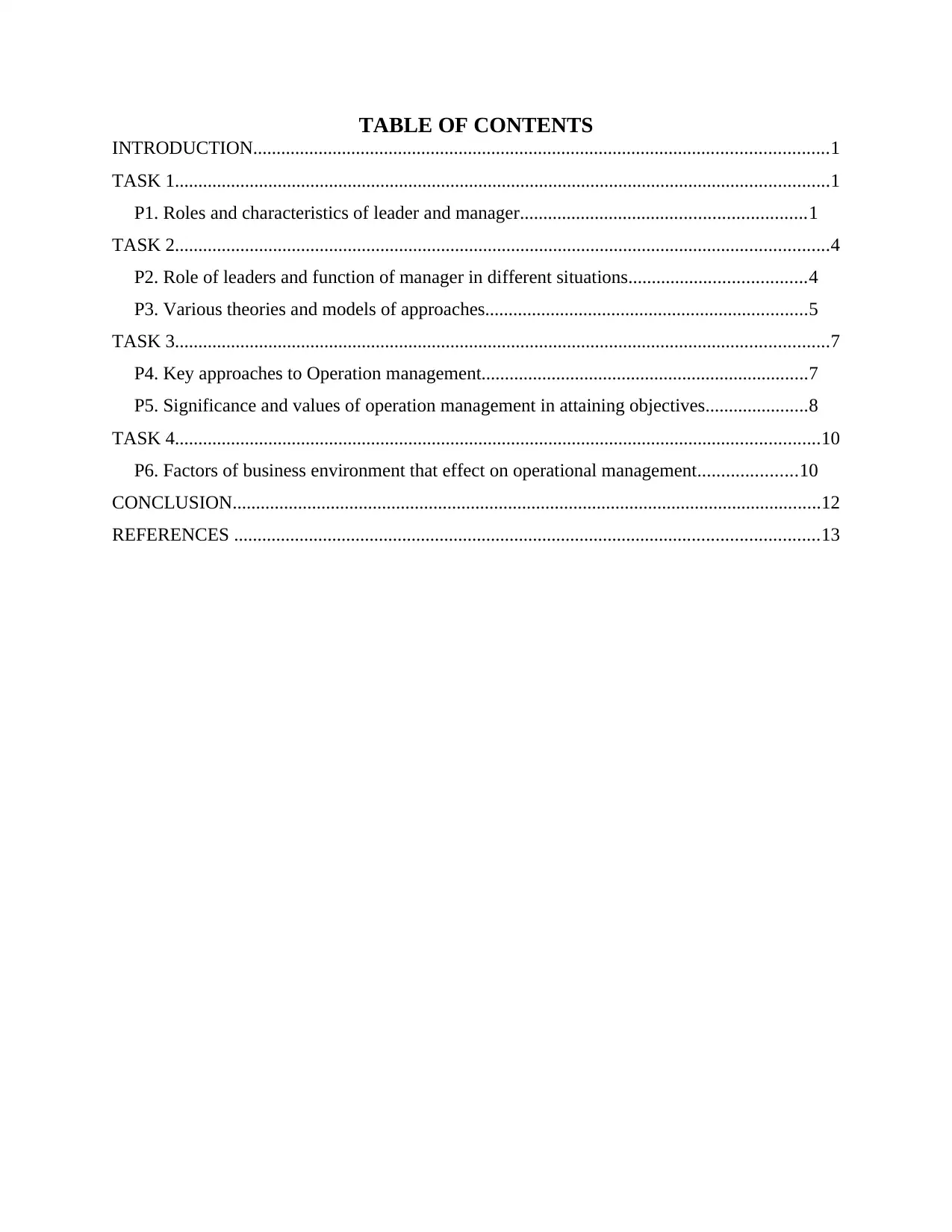
TABLE OF CONTENTS
INTRODUCTION...........................................................................................................................1
TASK 1............................................................................................................................................1
P1. Roles and characteristics of leader and manager.............................................................1
TASK 2............................................................................................................................................4
P2. Role of leaders and function of manager in different situations......................................4
P3. Various theories and models of approaches.....................................................................5
TASK 3............................................................................................................................................7
P4. Key approaches to Operation management......................................................................7
P5. Significance and values of operation management in attaining objectives......................8
TASK 4..........................................................................................................................................10
P6. Factors of business environment that effect on operational management.....................10
CONCLUSION..............................................................................................................................12
REFERENCES .............................................................................................................................13
INTRODUCTION...........................................................................................................................1
TASK 1............................................................................................................................................1
P1. Roles and characteristics of leader and manager.............................................................1
TASK 2............................................................................................................................................4
P2. Role of leaders and function of manager in different situations......................................4
P3. Various theories and models of approaches.....................................................................5
TASK 3............................................................................................................................................7
P4. Key approaches to Operation management......................................................................7
P5. Significance and values of operation management in attaining objectives......................8
TASK 4..........................................................................................................................................10
P6. Factors of business environment that effect on operational management.....................10
CONCLUSION..............................................................................................................................12
REFERENCES .............................................................................................................................13
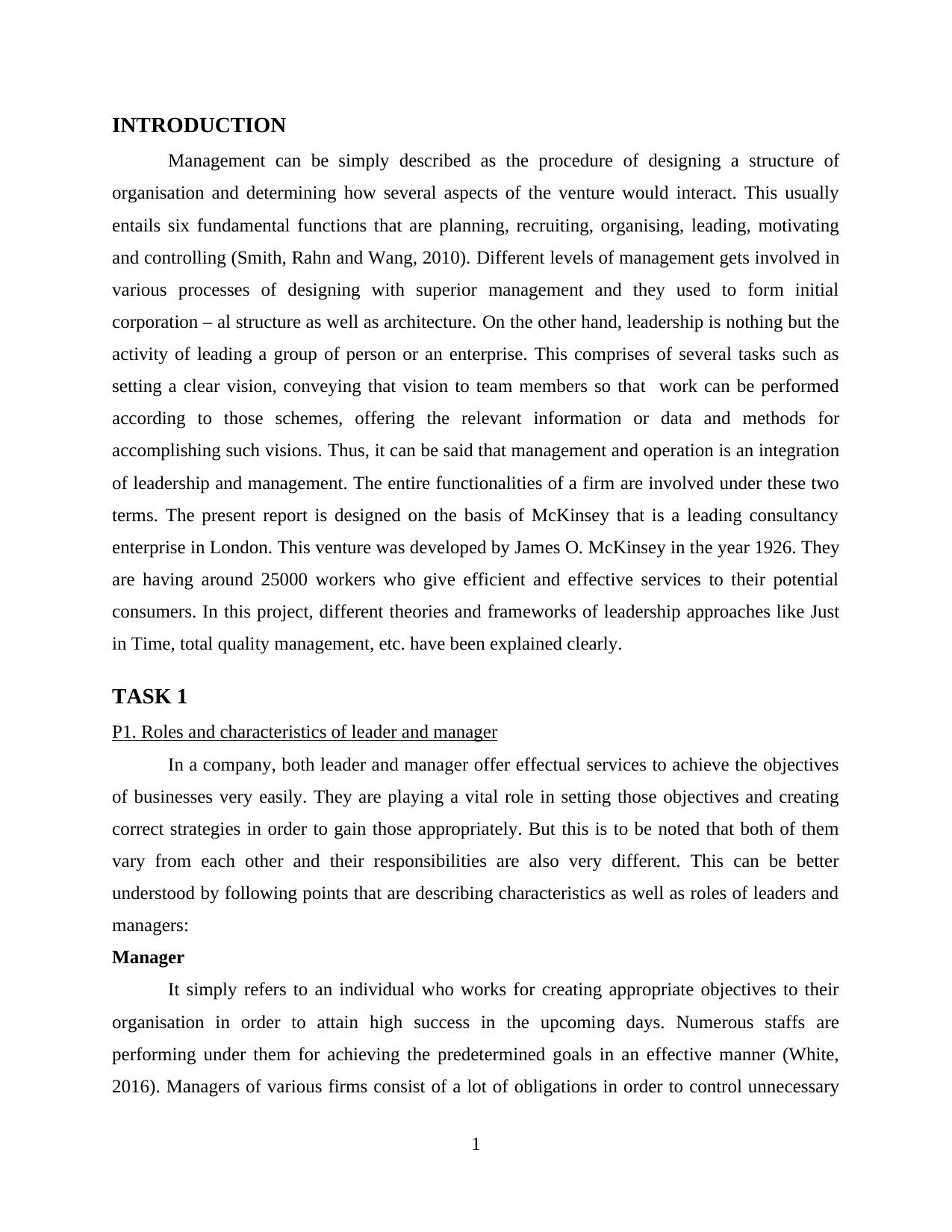
INTRODUCTION
Management can be simply described as the procedure of designing a structure of
organisation and determining how several aspects of the venture would interact. This usually
entails six fundamental functions that are planning, recruiting, organising, leading, motivating
and controlling (Smith, Rahn and Wang, 2010). Different levels of management gets involved in
various processes of designing with superior management and they used to form initial
corporation – al structure as well as architecture. On the other hand, leadership is nothing but the
activity of leading a group of person or an enterprise. This comprises of several tasks such as
setting a clear vision, conveying that vision to team members so that work can be performed
according to those schemes, offering the relevant information or data and methods for
accomplishing such visions. Thus, it can be said that management and operation is an integration
of leadership and management. The entire functionalities of a firm are involved under these two
terms. The present report is designed on the basis of McKinsey that is a leading consultancy
enterprise in London. This venture was developed by James O. McKinsey in the year 1926. They
are having around 25000 workers who give efficient and effective services to their potential
consumers. In this project, different theories and frameworks of leadership approaches like Just
in Time, total quality management, etc. have been explained clearly.
TASK 1
P1. Roles and characteristics of leader and manager
In a company, both leader and manager offer effectual services to achieve the objectives
of businesses very easily. They are playing a vital role in setting those objectives and creating
correct strategies in order to gain those appropriately. But this is to be noted that both of them
vary from each other and their responsibilities are also very different. This can be better
understood by following points that are describing characteristics as well as roles of leaders and
managers:
Manager
It simply refers to an individual who works for creating appropriate objectives to their
organisation in order to attain high success in the upcoming days. Numerous staffs are
performing under them for achieving the predetermined goals in an effective manner (White,
2016). Managers of various firms consist of a lot of obligations in order to control unnecessary
1
Management can be simply described as the procedure of designing a structure of
organisation and determining how several aspects of the venture would interact. This usually
entails six fundamental functions that are planning, recruiting, organising, leading, motivating
and controlling (Smith, Rahn and Wang, 2010). Different levels of management gets involved in
various processes of designing with superior management and they used to form initial
corporation – al structure as well as architecture. On the other hand, leadership is nothing but the
activity of leading a group of person or an enterprise. This comprises of several tasks such as
setting a clear vision, conveying that vision to team members so that work can be performed
according to those schemes, offering the relevant information or data and methods for
accomplishing such visions. Thus, it can be said that management and operation is an integration
of leadership and management. The entire functionalities of a firm are involved under these two
terms. The present report is designed on the basis of McKinsey that is a leading consultancy
enterprise in London. This venture was developed by James O. McKinsey in the year 1926. They
are having around 25000 workers who give efficient and effective services to their potential
consumers. In this project, different theories and frameworks of leadership approaches like Just
in Time, total quality management, etc. have been explained clearly.
TASK 1
P1. Roles and characteristics of leader and manager
In a company, both leader and manager offer effectual services to achieve the objectives
of businesses very easily. They are playing a vital role in setting those objectives and creating
correct strategies in order to gain those appropriately. But this is to be noted that both of them
vary from each other and their responsibilities are also very different. This can be better
understood by following points that are describing characteristics as well as roles of leaders and
managers:
Manager
It simply refers to an individual who works for creating appropriate objectives to their
organisation in order to attain high success in the upcoming days. Numerous staffs are
performing under them for achieving the predetermined goals in an effective manner (White,
2016). Managers of various firms consist of a lot of obligations in order to control unnecessary
1
⊘ This is a preview!⊘
Do you want full access?
Subscribe today to unlock all pages.

Trusted by 1+ million students worldwide
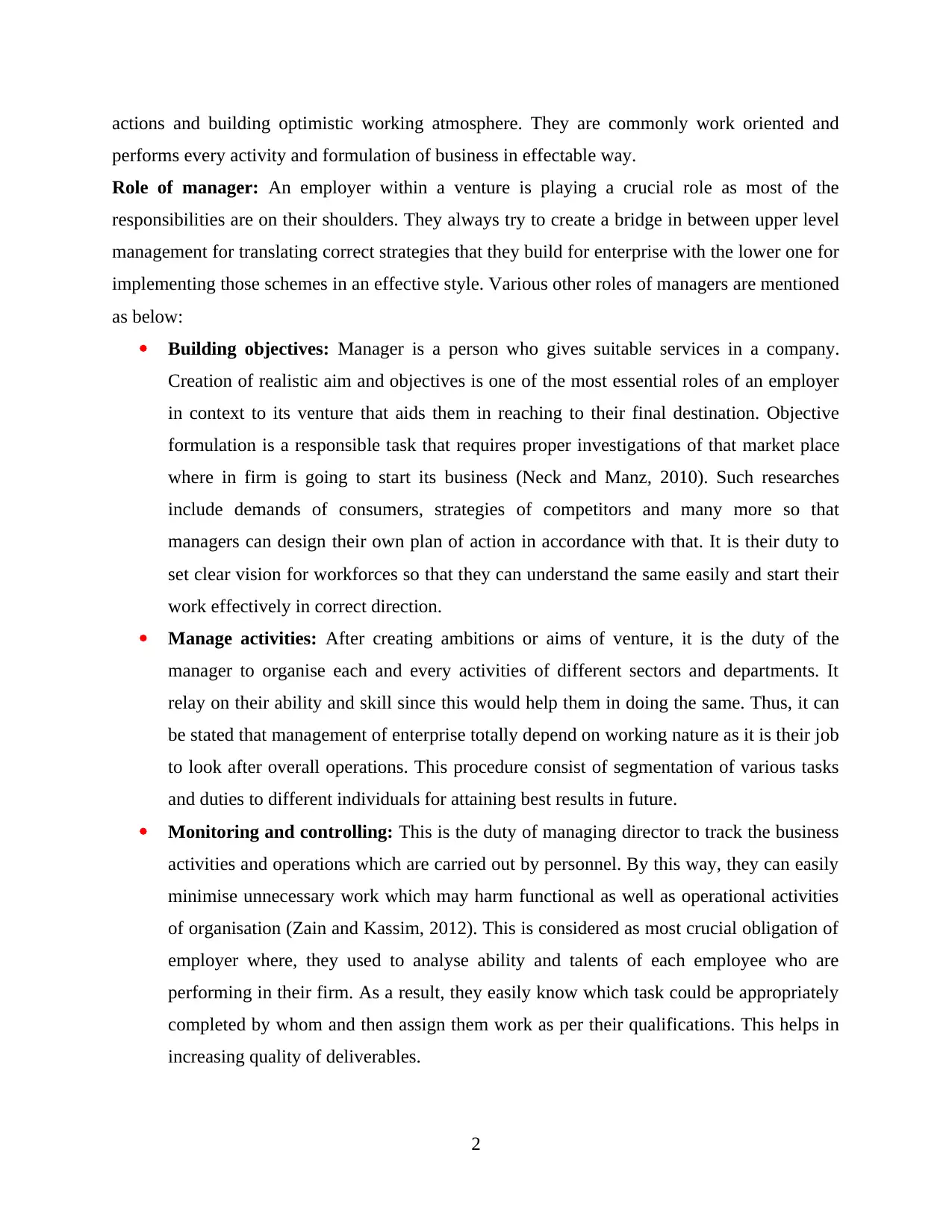
actions and building optimistic working atmosphere. They are commonly work oriented and
performs every activity and formulation of business in effectable way.
Role of manager: An employer within a venture is playing a crucial role as most of the
responsibilities are on their shoulders. They always try to create a bridge in between upper level
management for translating correct strategies that they build for enterprise with the lower one for
implementing those schemes in an effective style. Various other roles of managers are mentioned
as below:
Building objectives: Manager is a person who gives suitable services in a company.
Creation of realistic aim and objectives is one of the most essential roles of an employer
in context to its venture that aids them in reaching to their final destination. Objective
formulation is a responsible task that requires proper investigations of that market place
where in firm is going to start its business (Neck and Manz, 2010). Such researches
include demands of consumers, strategies of competitors and many more so that
managers can design their own plan of action in accordance with that. It is their duty to
set clear vision for workforces so that they can understand the same easily and start their
work effectively in correct direction.
Manage activities: After creating ambitions or aims of venture, it is the duty of the
manager to organise each and every activities of different sectors and departments. It
relay on their ability and skill since this would help them in doing the same. Thus, it can
be stated that management of enterprise totally depend on working nature as it is their job
to look after overall operations. This procedure consist of segmentation of various tasks
and duties to different individuals for attaining best results in future.
Monitoring and controlling: This is the duty of managing director to track the business
activities and operations which are carried out by personnel. By this way, they can easily
minimise unnecessary work which may harm functional as well as operational activities
of organisation (Zain and Kassim, 2012). This is considered as most crucial obligation of
employer where, they used to analyse ability and talents of each employee who are
performing in their firm. As a result, they easily know which task could be appropriately
completed by whom and then assign them work as per their qualifications. This helps in
increasing quality of deliverables.
2
performs every activity and formulation of business in effectable way.
Role of manager: An employer within a venture is playing a crucial role as most of the
responsibilities are on their shoulders. They always try to create a bridge in between upper level
management for translating correct strategies that they build for enterprise with the lower one for
implementing those schemes in an effective style. Various other roles of managers are mentioned
as below:
Building objectives: Manager is a person who gives suitable services in a company.
Creation of realistic aim and objectives is one of the most essential roles of an employer
in context to its venture that aids them in reaching to their final destination. Objective
formulation is a responsible task that requires proper investigations of that market place
where in firm is going to start its business (Neck and Manz, 2010). Such researches
include demands of consumers, strategies of competitors and many more so that
managers can design their own plan of action in accordance with that. It is their duty to
set clear vision for workforces so that they can understand the same easily and start their
work effectively in correct direction.
Manage activities: After creating ambitions or aims of venture, it is the duty of the
manager to organise each and every activities of different sectors and departments. It
relay on their ability and skill since this would help them in doing the same. Thus, it can
be stated that management of enterprise totally depend on working nature as it is their job
to look after overall operations. This procedure consist of segmentation of various tasks
and duties to different individuals for attaining best results in future.
Monitoring and controlling: This is the duty of managing director to track the business
activities and operations which are carried out by personnel. By this way, they can easily
minimise unnecessary work which may harm functional as well as operational activities
of organisation (Zain and Kassim, 2012). This is considered as most crucial obligation of
employer where, they used to analyse ability and talents of each employee who are
performing in their firm. As a result, they easily know which task could be appropriately
completed by whom and then assign them work as per their qualifications. This helps in
increasing quality of deliverables.
2
Paraphrase This Document
Need a fresh take? Get an instant paraphrase of this document with our AI Paraphraser
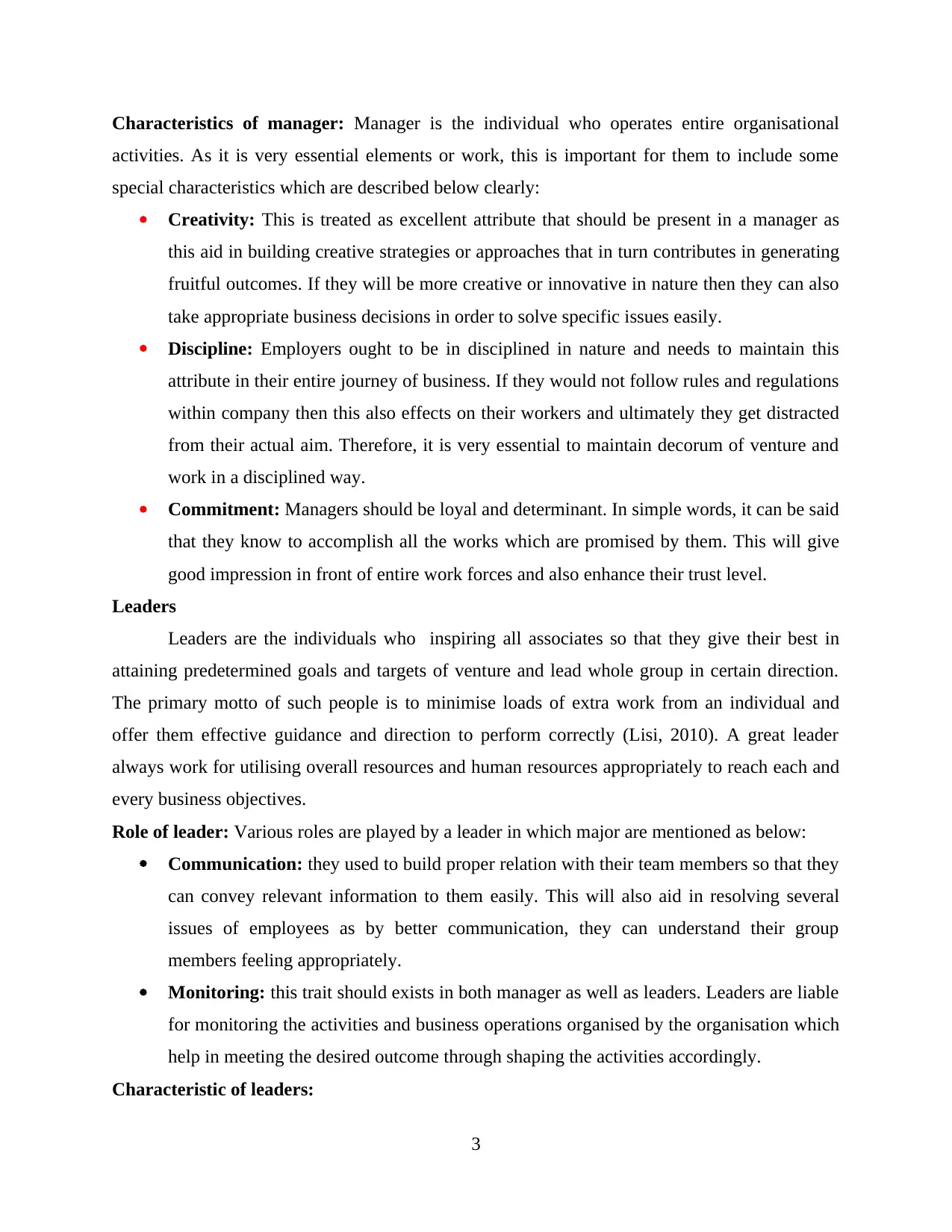
Characteristics of manager: Manager is the individual who operates entire organisational
activities. As it is very essential elements or work, this is important for them to include some
special characteristics which are described below clearly:
Creativity: This is treated as excellent attribute that should be present in a manager as
this aid in building creative strategies or approaches that in turn contributes in generating
fruitful outcomes. If they will be more creative or innovative in nature then they can also
take appropriate business decisions in order to solve specific issues easily.
Discipline: Employers ought to be in disciplined in nature and needs to maintain this
attribute in their entire journey of business. If they would not follow rules and regulations
within company then this also effects on their workers and ultimately they get distracted
from their actual aim. Therefore, it is very essential to maintain decorum of venture and
work in a disciplined way.
Commitment: Managers should be loyal and determinant. In simple words, it can be said
that they know to accomplish all the works which are promised by them. This will give
good impression in front of entire work forces and also enhance their trust level.
Leaders
Leaders are the individuals who inspiring all associates so that they give their best in
attaining predetermined goals and targets of venture and lead whole group in certain direction.
The primary motto of such people is to minimise loads of extra work from an individual and
offer them effective guidance and direction to perform correctly (Lisi, 2010). A great leader
always work for utilising overall resources and human resources appropriately to reach each and
every business objectives.
Role of leader: Various roles are played by a leader in which major are mentioned as below:
Communication: they used to build proper relation with their team members so that they
can convey relevant information to them easily. This will also aid in resolving several
issues of employees as by better communication, they can understand their group
members feeling appropriately.
Monitoring: this trait should exists in both manager as well as leaders. Leaders are liable
for monitoring the activities and business operations organised by the organisation which
help in meeting the desired outcome through shaping the activities accordingly.
Characteristic of leaders:
3
activities. As it is very essential elements or work, this is important for them to include some
special characteristics which are described below clearly:
Creativity: This is treated as excellent attribute that should be present in a manager as
this aid in building creative strategies or approaches that in turn contributes in generating
fruitful outcomes. If they will be more creative or innovative in nature then they can also
take appropriate business decisions in order to solve specific issues easily.
Discipline: Employers ought to be in disciplined in nature and needs to maintain this
attribute in their entire journey of business. If they would not follow rules and regulations
within company then this also effects on their workers and ultimately they get distracted
from their actual aim. Therefore, it is very essential to maintain decorum of venture and
work in a disciplined way.
Commitment: Managers should be loyal and determinant. In simple words, it can be said
that they know to accomplish all the works which are promised by them. This will give
good impression in front of entire work forces and also enhance their trust level.
Leaders
Leaders are the individuals who inspiring all associates so that they give their best in
attaining predetermined goals and targets of venture and lead whole group in certain direction.
The primary motto of such people is to minimise loads of extra work from an individual and
offer them effective guidance and direction to perform correctly (Lisi, 2010). A great leader
always work for utilising overall resources and human resources appropriately to reach each and
every business objectives.
Role of leader: Various roles are played by a leader in which major are mentioned as below:
Communication: they used to build proper relation with their team members so that they
can convey relevant information to them easily. This will also aid in resolving several
issues of employees as by better communication, they can understand their group
members feeling appropriately.
Monitoring: this trait should exists in both manager as well as leaders. Leaders are liable
for monitoring the activities and business operations organised by the organisation which
help in meeting the desired outcome through shaping the activities accordingly.
Characteristic of leaders:
3
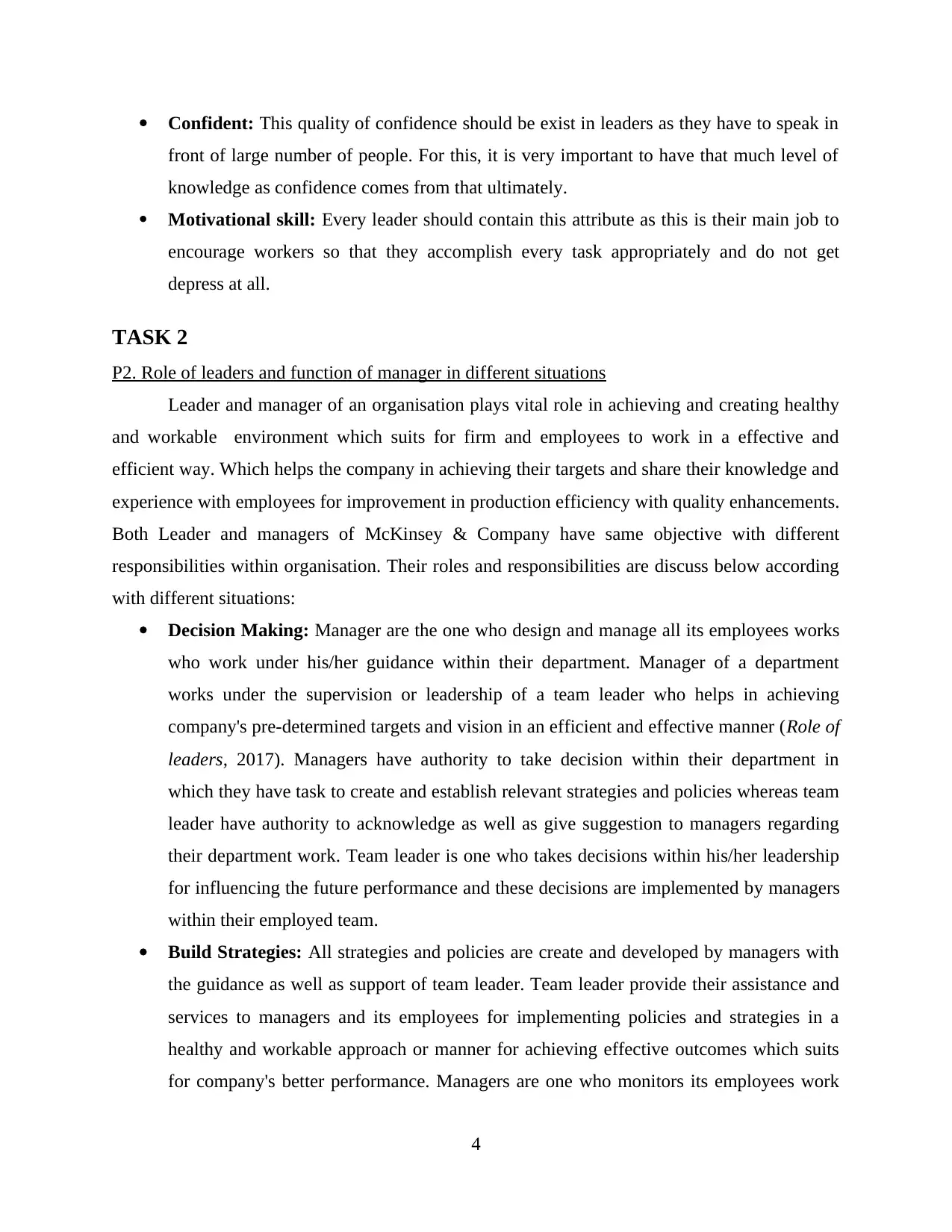
Confident: This quality of confidence should be exist in leaders as they have to speak in
front of large number of people. For this, it is very important to have that much level of
knowledge as confidence comes from that ultimately.
Motivational skill: Every leader should contain this attribute as this is their main job to
encourage workers so that they accomplish every task appropriately and do not get
depress at all.
TASK 2
P2. Role of leaders and function of manager in different situations
Leader and manager of an organisation plays vital role in achieving and creating healthy
and workable environment which suits for firm and employees to work in a effective and
efficient way. Which helps the company in achieving their targets and share their knowledge and
experience with employees for improvement in production efficiency with quality enhancements.
Both Leader and managers of McKinsey & Company have same objective with different
responsibilities within organisation. Their roles and responsibilities are discuss below according
with different situations:
Decision Making: Manager are the one who design and manage all its employees works
who work under his/her guidance within their department. Manager of a department
works under the supervision or leadership of a team leader who helps in achieving
company's pre-determined targets and vision in an efficient and effective manner (Role of
leaders, 2017). Managers have authority to take decision within their department in
which they have task to create and establish relevant strategies and policies whereas team
leader have authority to acknowledge as well as give suggestion to managers regarding
their department work. Team leader is one who takes decisions within his/her leadership
for influencing the future performance and these decisions are implemented by managers
within their employed team.
Build Strategies: All strategies and policies are create and developed by managers with
the guidance as well as support of team leader. Team leader provide their assistance and
services to managers and its employees for implementing policies and strategies in a
healthy and workable approach or manner for achieving effective outcomes which suits
for company's better performance. Managers are one who monitors its employees work
4
front of large number of people. For this, it is very important to have that much level of
knowledge as confidence comes from that ultimately.
Motivational skill: Every leader should contain this attribute as this is their main job to
encourage workers so that they accomplish every task appropriately and do not get
depress at all.
TASK 2
P2. Role of leaders and function of manager in different situations
Leader and manager of an organisation plays vital role in achieving and creating healthy
and workable environment which suits for firm and employees to work in a effective and
efficient way. Which helps the company in achieving their targets and share their knowledge and
experience with employees for improvement in production efficiency with quality enhancements.
Both Leader and managers of McKinsey & Company have same objective with different
responsibilities within organisation. Their roles and responsibilities are discuss below according
with different situations:
Decision Making: Manager are the one who design and manage all its employees works
who work under his/her guidance within their department. Manager of a department
works under the supervision or leadership of a team leader who helps in achieving
company's pre-determined targets and vision in an efficient and effective manner (Role of
leaders, 2017). Managers have authority to take decision within their department in
which they have task to create and establish relevant strategies and policies whereas team
leader have authority to acknowledge as well as give suggestion to managers regarding
their department work. Team leader is one who takes decisions within his/her leadership
for influencing the future performance and these decisions are implemented by managers
within their employed team.
Build Strategies: All strategies and policies are create and developed by managers with
the guidance as well as support of team leader. Team leader provide their assistance and
services to managers and its employees for implementing policies and strategies in a
healthy and workable approach or manner for achieving effective outcomes which suits
for company's better performance. Managers are one who monitors its employees work
4
⊘ This is a preview!⊘
Do you want full access?
Subscribe today to unlock all pages.

Trusted by 1+ million students worldwide
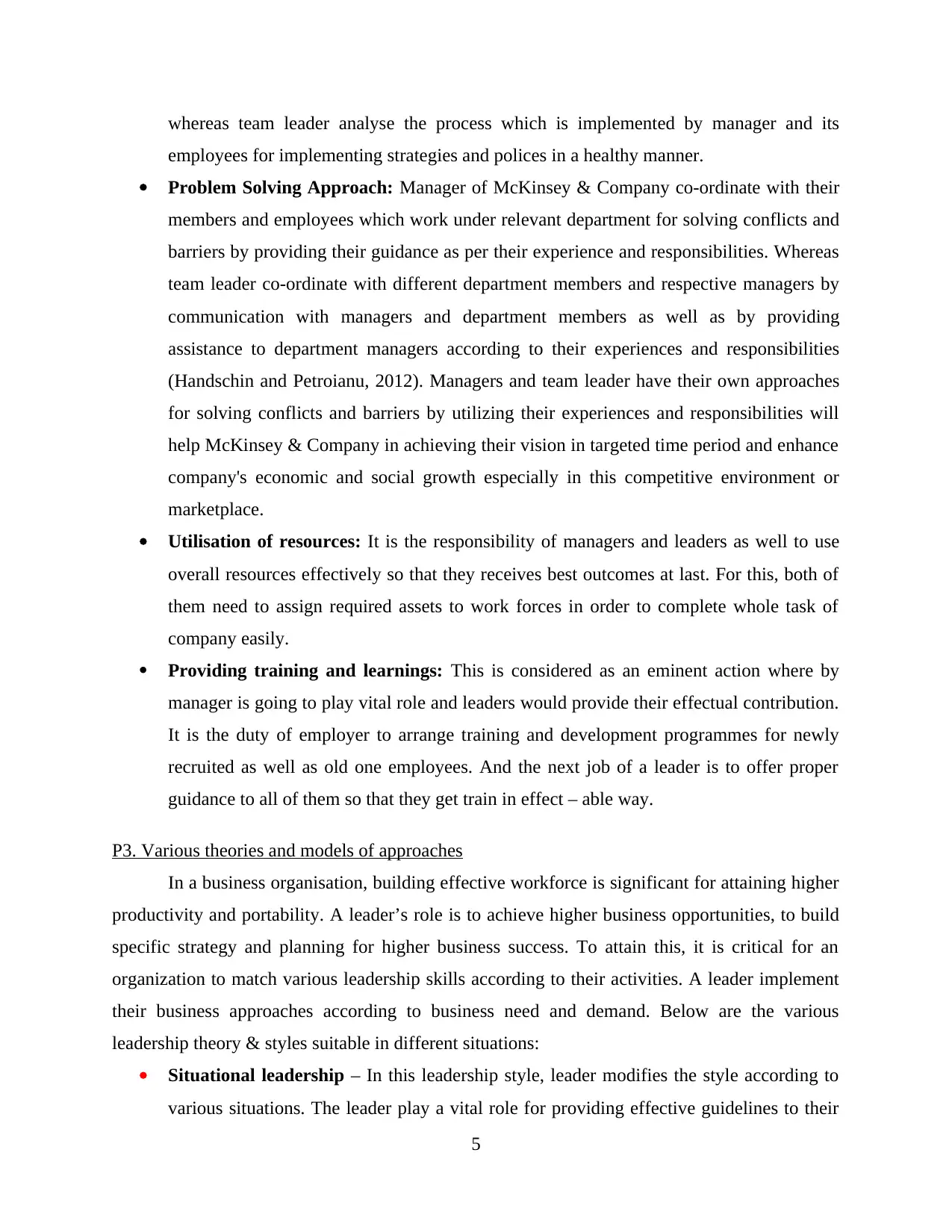
whereas team leader analyse the process which is implemented by manager and its
employees for implementing strategies and polices in a healthy manner.
Problem Solving Approach: Manager of McKinsey & Company co-ordinate with their
members and employees which work under relevant department for solving conflicts and
barriers by providing their guidance as per their experience and responsibilities. Whereas
team leader co-ordinate with different department members and respective managers by
communication with managers and department members as well as by providing
assistance to department managers according to their experiences and responsibilities
(Handschin and Petroianu, 2012). Managers and team leader have their own approaches
for solving conflicts and barriers by utilizing their experiences and responsibilities will
help McKinsey & Company in achieving their vision in targeted time period and enhance
company's economic and social growth especially in this competitive environment or
marketplace.
Utilisation of resources: It is the responsibility of managers and leaders as well to use
overall resources effectively so that they receives best outcomes at last. For this, both of
them need to assign required assets to work forces in order to complete whole task of
company easily.
Providing training and learnings: This is considered as an eminent action where by
manager is going to play vital role and leaders would provide their effectual contribution.
It is the duty of employer to arrange training and development programmes for newly
recruited as well as old one employees. And the next job of a leader is to offer proper
guidance to all of them so that they get train in effect – able way.
P3. Various theories and models of approaches
In a business organisation, building effective workforce is significant for attaining higher
productivity and portability. A leader’s role is to achieve higher business opportunities, to build
specific strategy and planning for higher business success. To attain this, it is critical for an
organization to match various leadership skills according to their activities. A leader implement
their business approaches according to business need and demand. Below are the various
leadership theory & styles suitable in different situations:
Situational leadership – In this leadership style, leader modifies the style according to
various situations. The leader play a vital role for providing effective guidelines to their
5
employees for implementing strategies and polices in a healthy manner.
Problem Solving Approach: Manager of McKinsey & Company co-ordinate with their
members and employees which work under relevant department for solving conflicts and
barriers by providing their guidance as per their experience and responsibilities. Whereas
team leader co-ordinate with different department members and respective managers by
communication with managers and department members as well as by providing
assistance to department managers according to their experiences and responsibilities
(Handschin and Petroianu, 2012). Managers and team leader have their own approaches
for solving conflicts and barriers by utilizing their experiences and responsibilities will
help McKinsey & Company in achieving their vision in targeted time period and enhance
company's economic and social growth especially in this competitive environment or
marketplace.
Utilisation of resources: It is the responsibility of managers and leaders as well to use
overall resources effectively so that they receives best outcomes at last. For this, both of
them need to assign required assets to work forces in order to complete whole task of
company easily.
Providing training and learnings: This is considered as an eminent action where by
manager is going to play vital role and leaders would provide their effectual contribution.
It is the duty of employer to arrange training and development programmes for newly
recruited as well as old one employees. And the next job of a leader is to offer proper
guidance to all of them so that they get train in effect – able way.
P3. Various theories and models of approaches
In a business organisation, building effective workforce is significant for attaining higher
productivity and portability. A leader’s role is to achieve higher business opportunities, to build
specific strategy and planning for higher business success. To attain this, it is critical for an
organization to match various leadership skills according to their activities. A leader implement
their business approaches according to business need and demand. Below are the various
leadership theory & styles suitable in different situations:
Situational leadership – In this leadership style, leader modifies the style according to
various situations. The leader play a vital role for providing effective guidelines to their
5
Paraphrase This Document
Need a fresh take? Get an instant paraphrase of this document with our AI Paraphraser
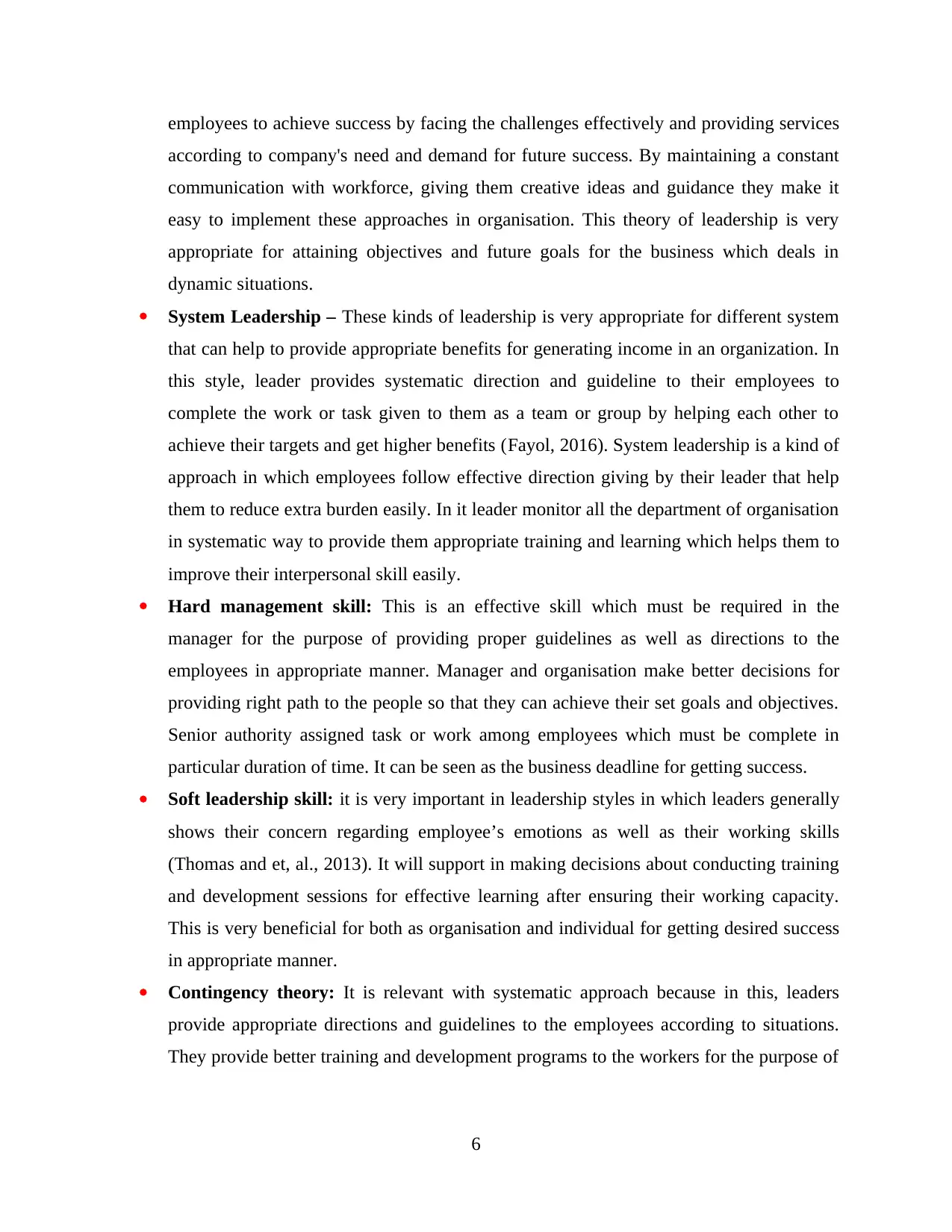
employees to achieve success by facing the challenges effectively and providing services
according to company's need and demand for future success. By maintaining a constant
communication with workforce, giving them creative ideas and guidance they make it
easy to implement these approaches in organisation. This theory of leadership is very
appropriate for attaining objectives and future goals for the business which deals in
dynamic situations.
System Leadership – These kinds of leadership is very appropriate for different system
that can help to provide appropriate benefits for generating income in an organization. In
this style, leader provides systematic direction and guideline to their employees to
complete the work or task given to them as a team or group by helping each other to
achieve their targets and get higher benefits (Fayol, 2016). System leadership is a kind of
approach in which employees follow effective direction giving by their leader that help
them to reduce extra burden easily. In it leader monitor all the department of organisation
in systematic way to provide them appropriate training and learning which helps them to
improve their interpersonal skill easily.
Hard management skill: This is an effective skill which must be required in the
manager for the purpose of providing proper guidelines as well as directions to the
employees in appropriate manner. Manager and organisation make better decisions for
providing right path to the people so that they can achieve their set goals and objectives.
Senior authority assigned task or work among employees which must be complete in
particular duration of time. It can be seen as the business deadline for getting success.
Soft leadership skill: it is very important in leadership styles in which leaders generally
shows their concern regarding employee’s emotions as well as their working skills
(Thomas and et, al., 2013). It will support in making decisions about conducting training
and development sessions for effective learning after ensuring their working capacity.
This is very beneficial for both as organisation and individual for getting desired success
in appropriate manner.
Contingency theory: It is relevant with systematic approach because in this, leaders
provide appropriate directions and guidelines to the employees according to situations.
They provide better training and development programs to the workers for the purpose of
6
according to company's need and demand for future success. By maintaining a constant
communication with workforce, giving them creative ideas and guidance they make it
easy to implement these approaches in organisation. This theory of leadership is very
appropriate for attaining objectives and future goals for the business which deals in
dynamic situations.
System Leadership – These kinds of leadership is very appropriate for different system
that can help to provide appropriate benefits for generating income in an organization. In
this style, leader provides systematic direction and guideline to their employees to
complete the work or task given to them as a team or group by helping each other to
achieve their targets and get higher benefits (Fayol, 2016). System leadership is a kind of
approach in which employees follow effective direction giving by their leader that help
them to reduce extra burden easily. In it leader monitor all the department of organisation
in systematic way to provide them appropriate training and learning which helps them to
improve their interpersonal skill easily.
Hard management skill: This is an effective skill which must be required in the
manager for the purpose of providing proper guidelines as well as directions to the
employees in appropriate manner. Manager and organisation make better decisions for
providing right path to the people so that they can achieve their set goals and objectives.
Senior authority assigned task or work among employees which must be complete in
particular duration of time. It can be seen as the business deadline for getting success.
Soft leadership skill: it is very important in leadership styles in which leaders generally
shows their concern regarding employee’s emotions as well as their working skills
(Thomas and et, al., 2013). It will support in making decisions about conducting training
and development sessions for effective learning after ensuring their working capacity.
This is very beneficial for both as organisation and individual for getting desired success
in appropriate manner.
Contingency theory: It is relevant with systematic approach because in this, leaders
provide appropriate directions and guidelines to the employees according to situations.
They provide better training and development programs to the workers for the purpose of
6
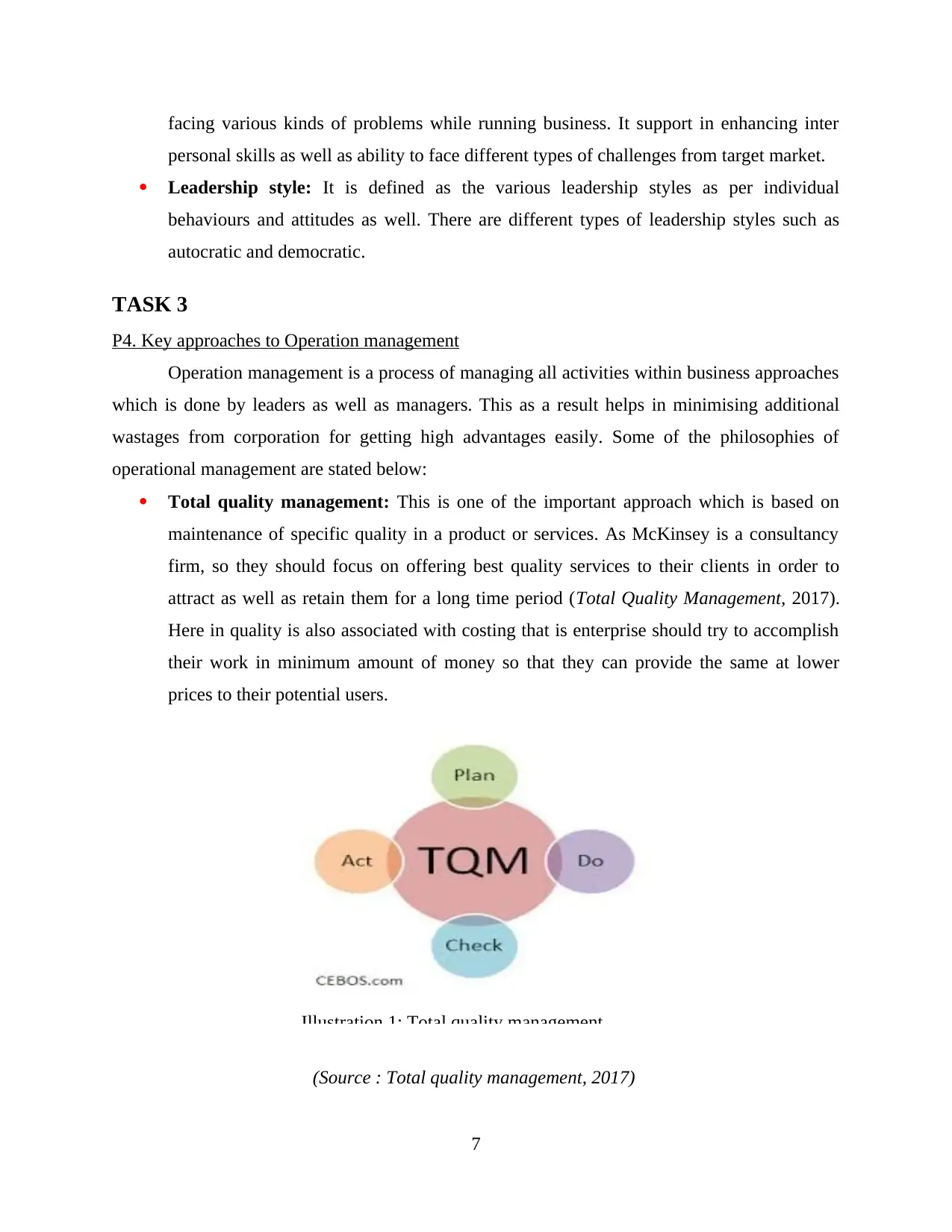
facing various kinds of problems while running business. It support in enhancing inter
personal skills as well as ability to face different types of challenges from target market.
Leadership style: It is defined as the various leadership styles as per individual
behaviours and attitudes as well. There are different types of leadership styles such as
autocratic and democratic.
TASK 3
P4. Key approaches to Operation management
Operation management is a process of managing all activities within business approaches
which is done by leaders as well as managers. This as a result helps in minimising additional
wastages from corporation for getting high advantages easily. Some of the philosophies of
operational management are stated below:
Total quality management: This is one of the important approach which is based on
maintenance of specific quality in a product or services. As McKinsey is a consultancy
firm, so they should focus on offering best quality services to their clients in order to
attract as well as retain them for a long time period (Total Quality Management, 2017).
Here in quality is also associated with costing that is enterprise should try to accomplish
their work in minimum amount of money so that they can provide the same at lower
prices to their potential users.
(Source : Total quality management, 2017)
7
Illustration 1: Total quality management
personal skills as well as ability to face different types of challenges from target market.
Leadership style: It is defined as the various leadership styles as per individual
behaviours and attitudes as well. There are different types of leadership styles such as
autocratic and democratic.
TASK 3
P4. Key approaches to Operation management
Operation management is a process of managing all activities within business approaches
which is done by leaders as well as managers. This as a result helps in minimising additional
wastages from corporation for getting high advantages easily. Some of the philosophies of
operational management are stated below:
Total quality management: This is one of the important approach which is based on
maintenance of specific quality in a product or services. As McKinsey is a consultancy
firm, so they should focus on offering best quality services to their clients in order to
attract as well as retain them for a long time period (Total Quality Management, 2017).
Here in quality is also associated with costing that is enterprise should try to accomplish
their work in minimum amount of money so that they can provide the same at lower
prices to their potential users.
(Source : Total quality management, 2017)
7
Illustration 1: Total quality management
⊘ This is a preview!⊘
Do you want full access?
Subscribe today to unlock all pages.

Trusted by 1+ million students worldwide
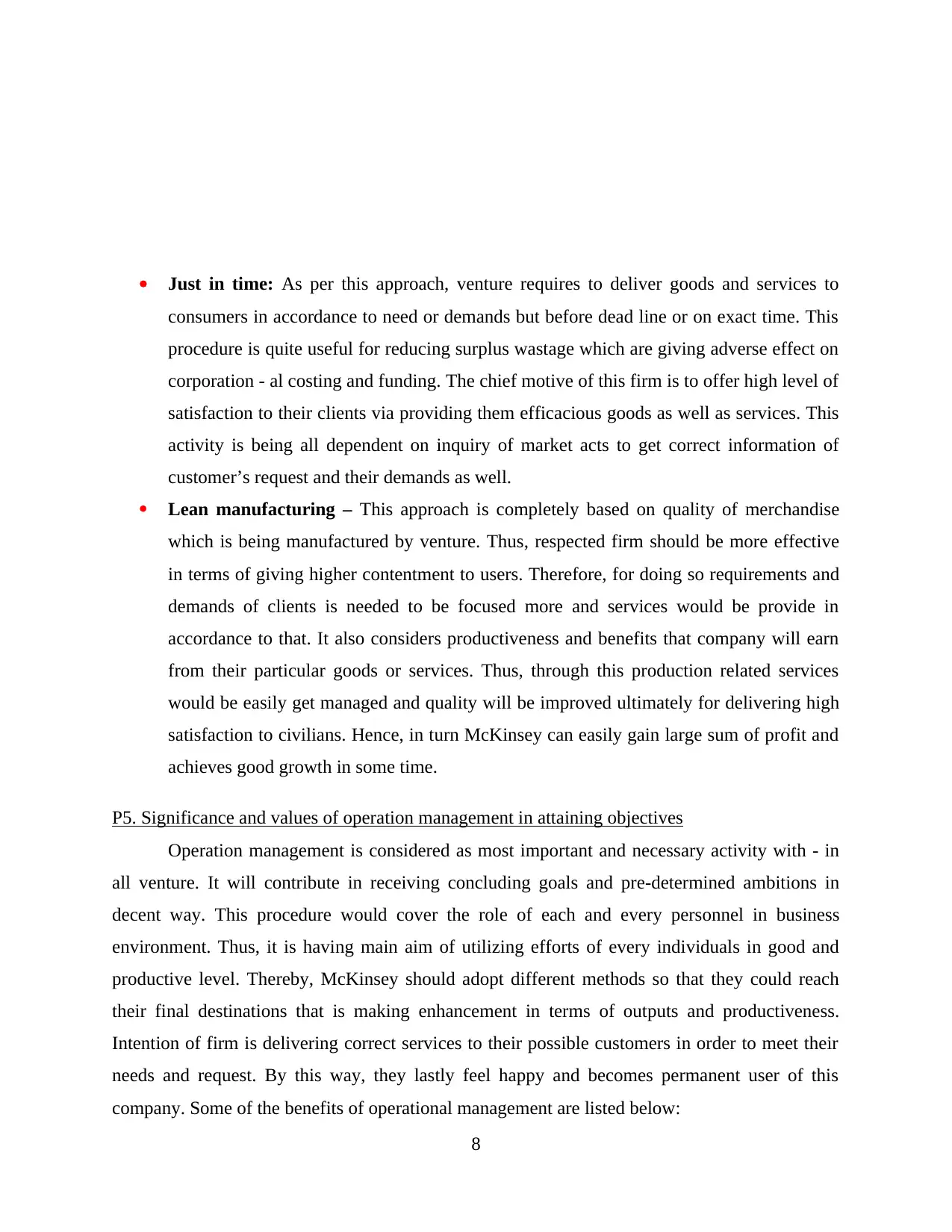
Just in time: As per this approach, venture requires to deliver goods and services to
consumers in accordance to need or demands but before dead line or on exact time. This
procedure is quite useful for reducing surplus wastage which are giving adverse effect on
corporation - al costing and funding. The chief motive of this firm is to offer high level of
satisfaction to their clients via providing them efficacious goods as well as services. This
activity is being all dependent on inquiry of market acts to get correct information of
customer’s request and their demands as well.
Lean manufacturing – This approach is completely based on quality of merchandise
which is being manufactured by venture. Thus, respected firm should be more effective
in terms of giving higher contentment to users. Therefore, for doing so requirements and
demands of clients is needed to be focused more and services would be provide in
accordance to that. It also considers productiveness and benefits that company will earn
from their particular goods or services. Thus, through this production related services
would be easily get managed and quality will be improved ultimately for delivering high
satisfaction to civilians. Hence, in turn McKinsey can easily gain large sum of profit and
achieves good growth in some time.
P5. Significance and values of operation management in attaining objectives
Operation management is considered as most important and necessary activity with - in
all venture. It will contribute in receiving concluding goals and pre-determined ambitions in
decent way. This procedure would cover the role of each and every personnel in business
environment. Thus, it is having main aim of utilizing efforts of every individuals in good and
productive level. Thereby, McKinsey should adopt different methods so that they could reach
their final destinations that is making enhancement in terms of outputs and productiveness.
Intention of firm is delivering correct services to their possible customers in order to meet their
needs and request. By this way, they lastly feel happy and becomes permanent user of this
company. Some of the benefits of operational management are listed below:
8
consumers in accordance to need or demands but before dead line or on exact time. This
procedure is quite useful for reducing surplus wastage which are giving adverse effect on
corporation - al costing and funding. The chief motive of this firm is to offer high level of
satisfaction to their clients via providing them efficacious goods as well as services. This
activity is being all dependent on inquiry of market acts to get correct information of
customer’s request and their demands as well.
Lean manufacturing – This approach is completely based on quality of merchandise
which is being manufactured by venture. Thus, respected firm should be more effective
in terms of giving higher contentment to users. Therefore, for doing so requirements and
demands of clients is needed to be focused more and services would be provide in
accordance to that. It also considers productiveness and benefits that company will earn
from their particular goods or services. Thus, through this production related services
would be easily get managed and quality will be improved ultimately for delivering high
satisfaction to civilians. Hence, in turn McKinsey can easily gain large sum of profit and
achieves good growth in some time.
P5. Significance and values of operation management in attaining objectives
Operation management is considered as most important and necessary activity with - in
all venture. It will contribute in receiving concluding goals and pre-determined ambitions in
decent way. This procedure would cover the role of each and every personnel in business
environment. Thus, it is having main aim of utilizing efforts of every individuals in good and
productive level. Thereby, McKinsey should adopt different methods so that they could reach
their final destinations that is making enhancement in terms of outputs and productiveness.
Intention of firm is delivering correct services to their possible customers in order to meet their
needs and request. By this way, they lastly feel happy and becomes permanent user of this
company. Some of the benefits of operational management are listed below:
8
Paraphrase This Document
Need a fresh take? Get an instant paraphrase of this document with our AI Paraphraser
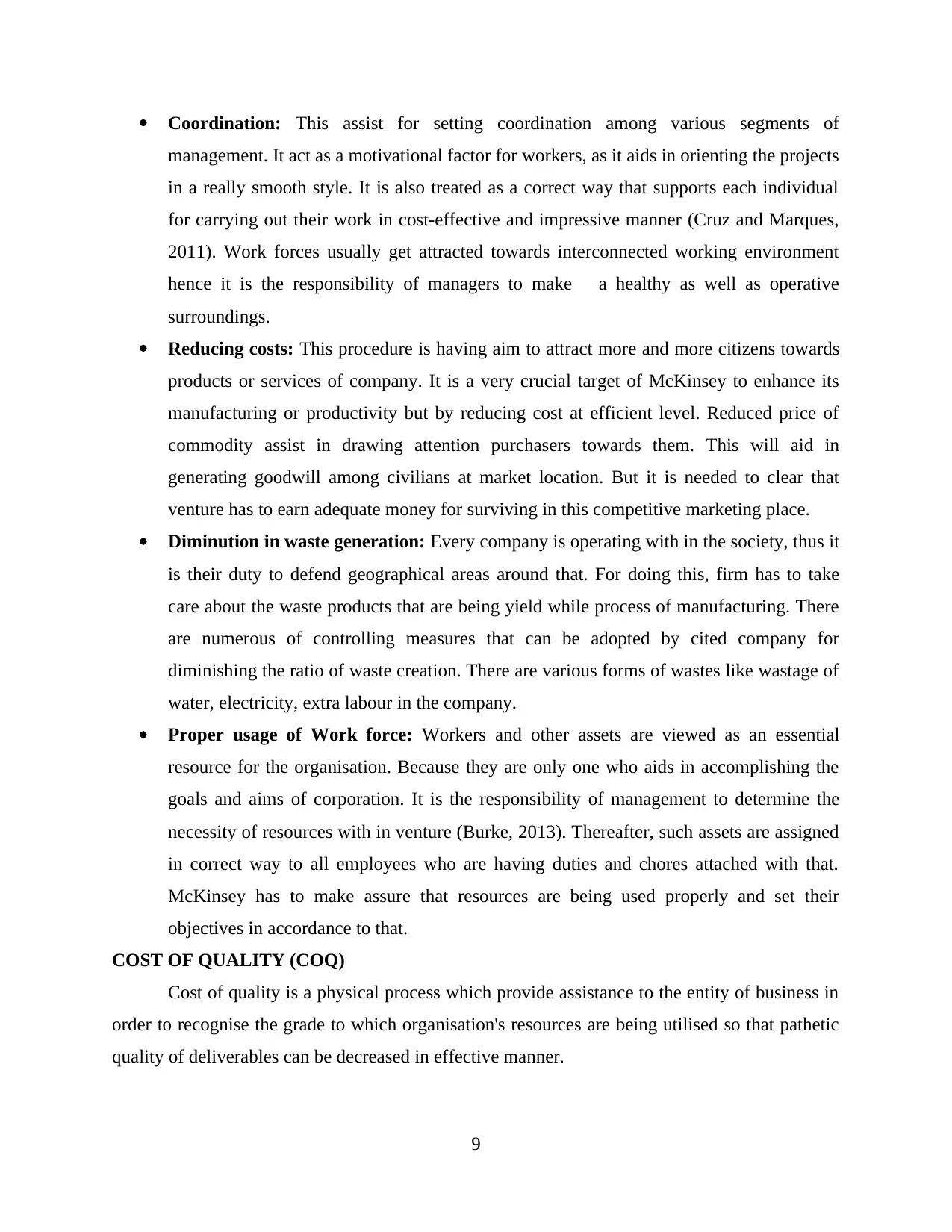
Coordination: This assist for setting coordination among various segments of
management. It act as a motivational factor for workers, as it aids in orienting the projects
in a really smooth style. It is also treated as a correct way that supports each individual
for carrying out their work in cost-effective and impressive manner (Cruz and Marques,
2011). Work forces usually get attracted towards interconnected working environment
hence it is the responsibility of managers to make a healthy as well as operative
surroundings.
Reducing costs: This procedure is having aim to attract more and more citizens towards
products or services of company. It is a very crucial target of McKinsey to enhance its
manufacturing or productivity but by reducing cost at efficient level. Reduced price of
commodity assist in drawing attention purchasers towards them. This will aid in
generating goodwill among civilians at market location. But it is needed to clear that
venture has to earn adequate money for surviving in this competitive marketing place.
Diminution in waste generation: Every company is operating with in the society, thus it
is their duty to defend geographical areas around that. For doing this, firm has to take
care about the waste products that are being yield while process of manufacturing. There
are numerous of controlling measures that can be adopted by cited company for
diminishing the ratio of waste creation. There are various forms of wastes like wastage of
water, electricity, extra labour in the company.
Proper usage of Work force: Workers and other assets are viewed as an essential
resource for the organisation. Because they are only one who aids in accomplishing the
goals and aims of corporation. It is the responsibility of management to determine the
necessity of resources with in venture (Burke, 2013). Thereafter, such assets are assigned
in correct way to all employees who are having duties and chores attached with that.
McKinsey has to make assure that resources are being used properly and set their
objectives in accordance to that.
COST OF QUALITY (COQ)
Cost of quality is a physical process which provide assistance to the entity of business in
order to recognise the grade to which organisation's resources are being utilised so that pathetic
quality of deliverables can be decreased in effective manner.
9
management. It act as a motivational factor for workers, as it aids in orienting the projects
in a really smooth style. It is also treated as a correct way that supports each individual
for carrying out their work in cost-effective and impressive manner (Cruz and Marques,
2011). Work forces usually get attracted towards interconnected working environment
hence it is the responsibility of managers to make a healthy as well as operative
surroundings.
Reducing costs: This procedure is having aim to attract more and more citizens towards
products or services of company. It is a very crucial target of McKinsey to enhance its
manufacturing or productivity but by reducing cost at efficient level. Reduced price of
commodity assist in drawing attention purchasers towards them. This will aid in
generating goodwill among civilians at market location. But it is needed to clear that
venture has to earn adequate money for surviving in this competitive marketing place.
Diminution in waste generation: Every company is operating with in the society, thus it
is their duty to defend geographical areas around that. For doing this, firm has to take
care about the waste products that are being yield while process of manufacturing. There
are numerous of controlling measures that can be adopted by cited company for
diminishing the ratio of waste creation. There are various forms of wastes like wastage of
water, electricity, extra labour in the company.
Proper usage of Work force: Workers and other assets are viewed as an essential
resource for the organisation. Because they are only one who aids in accomplishing the
goals and aims of corporation. It is the responsibility of management to determine the
necessity of resources with in venture (Burke, 2013). Thereafter, such assets are assigned
in correct way to all employees who are having duties and chores attached with that.
McKinsey has to make assure that resources are being used properly and set their
objectives in accordance to that.
COST OF QUALITY (COQ)
Cost of quality is a physical process which provide assistance to the entity of business in
order to recognise the grade to which organisation's resources are being utilised so that pathetic
quality of deliverables can be decreased in effective manner.
9
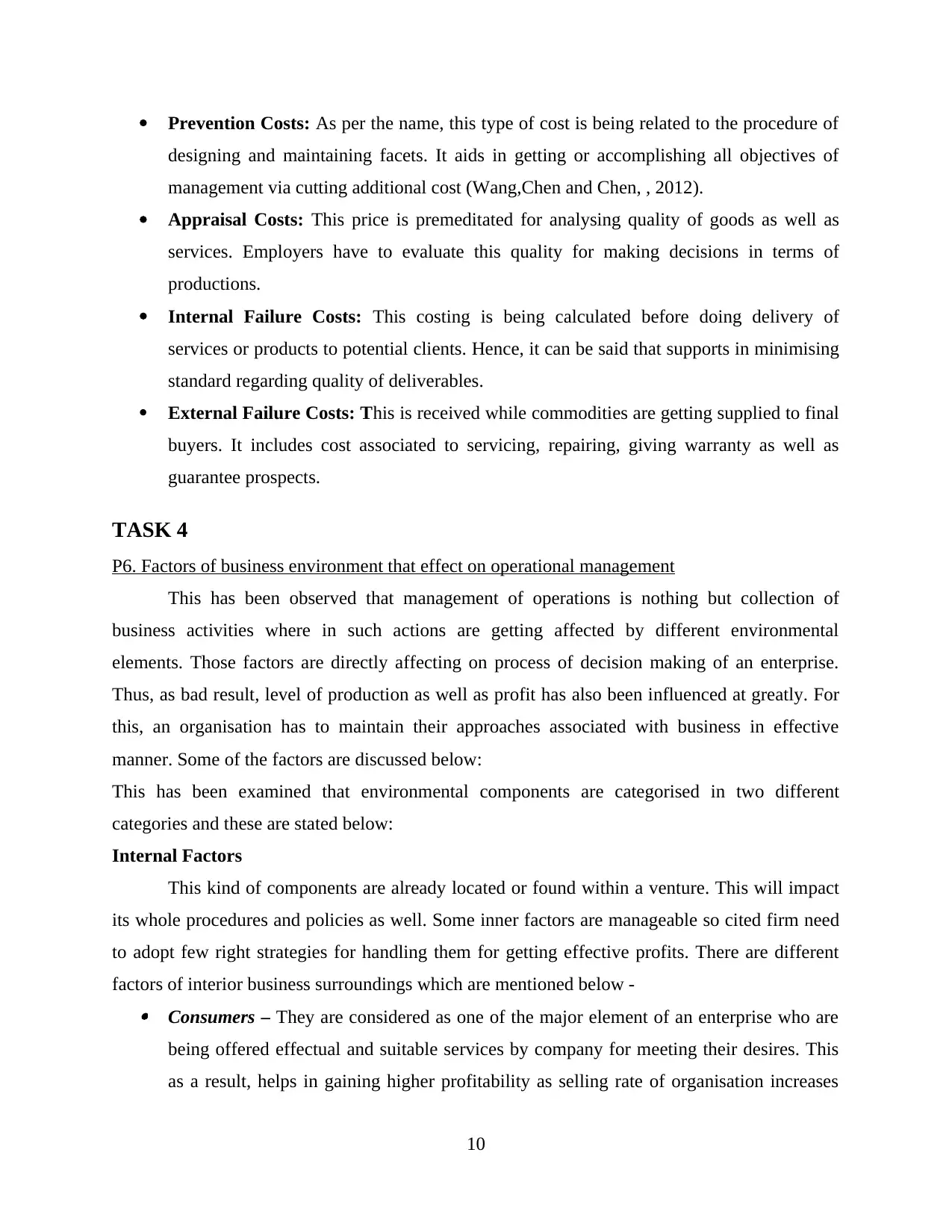
Prevention Costs: As per the name, this type of cost is being related to the procedure of
designing and maintaining facets. It aids in getting or accomplishing all objectives of
management via cutting additional cost (Wang,Chen and Chen, , 2012).
Appraisal Costs: This price is premeditated for analysing quality of goods as well as
services. Employers have to evaluate this quality for making decisions in terms of
productions.
Internal Failure Costs: This costing is being calculated before doing delivery of
services or products to potential clients. Hence, it can be said that supports in minimising
standard regarding quality of deliverables.
External Failure Costs: This is received while commodities are getting supplied to final
buyers. It includes cost associated to servicing, repairing, giving warranty as well as
guarantee prospects.
TASK 4
P6. Factors of business environment that effect on operational management
This has been observed that management of operations is nothing but collection of
business activities where in such actions are getting affected by different environmental
elements. Those factors are directly affecting on process of decision making of an enterprise.
Thus, as bad result, level of production as well as profit has also been influenced at greatly. For
this, an organisation has to maintain their approaches associated with business in effective
manner. Some of the factors are discussed below:
This has been examined that environmental components are categorised in two different
categories and these are stated below:
Internal Factors
This kind of components are already located or found within a venture. This will impact
its whole procedures and policies as well. Some inner factors are manageable so cited firm need
to adopt few right strategies for handling them for getting effective profits. There are different
factors of interior business surroundings which are mentioned below - Consumers – They are considered as one of the major element of an enterprise who are
being offered effectual and suitable services by company for meeting their desires. This
as a result, helps in gaining higher profitability as selling rate of organisation increases
10
designing and maintaining facets. It aids in getting or accomplishing all objectives of
management via cutting additional cost (Wang,Chen and Chen, , 2012).
Appraisal Costs: This price is premeditated for analysing quality of goods as well as
services. Employers have to evaluate this quality for making decisions in terms of
productions.
Internal Failure Costs: This costing is being calculated before doing delivery of
services or products to potential clients. Hence, it can be said that supports in minimising
standard regarding quality of deliverables.
External Failure Costs: This is received while commodities are getting supplied to final
buyers. It includes cost associated to servicing, repairing, giving warranty as well as
guarantee prospects.
TASK 4
P6. Factors of business environment that effect on operational management
This has been observed that management of operations is nothing but collection of
business activities where in such actions are getting affected by different environmental
elements. Those factors are directly affecting on process of decision making of an enterprise.
Thus, as bad result, level of production as well as profit has also been influenced at greatly. For
this, an organisation has to maintain their approaches associated with business in effective
manner. Some of the factors are discussed below:
This has been examined that environmental components are categorised in two different
categories and these are stated below:
Internal Factors
This kind of components are already located or found within a venture. This will impact
its whole procedures and policies as well. Some inner factors are manageable so cited firm need
to adopt few right strategies for handling them for getting effective profits. There are different
factors of interior business surroundings which are mentioned below - Consumers – They are considered as one of the major element of an enterprise who are
being offered effectual and suitable services by company for meeting their desires. This
as a result, helps in gaining higher profitability as selling rate of organisation increases
10
⊘ This is a preview!⊘
Do you want full access?
Subscribe today to unlock all pages.

Trusted by 1+ million students worldwide
1 out of 16
Related Documents
Your All-in-One AI-Powered Toolkit for Academic Success.
+13062052269
info@desklib.com
Available 24*7 on WhatsApp / Email
![[object Object]](/_next/static/media/star-bottom.7253800d.svg)
Unlock your academic potential
Copyright © 2020–2026 A2Z Services. All Rights Reserved. Developed and managed by ZUCOL.





